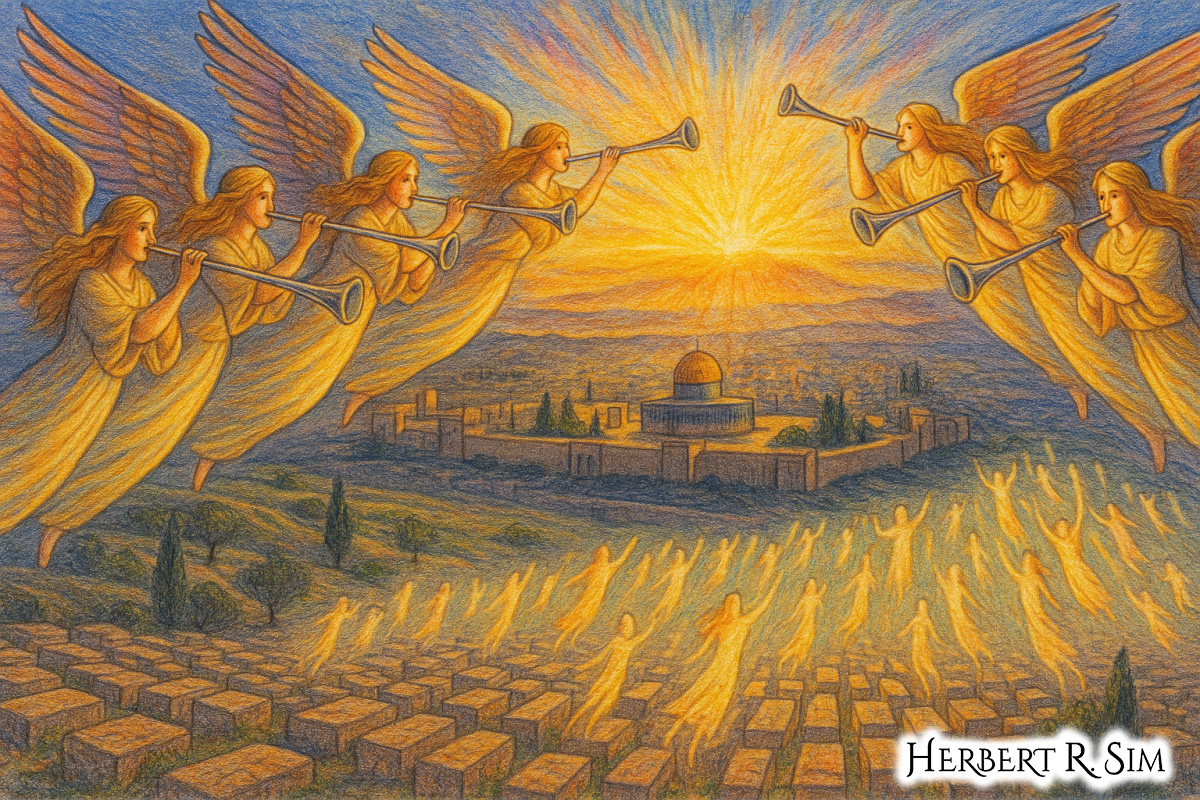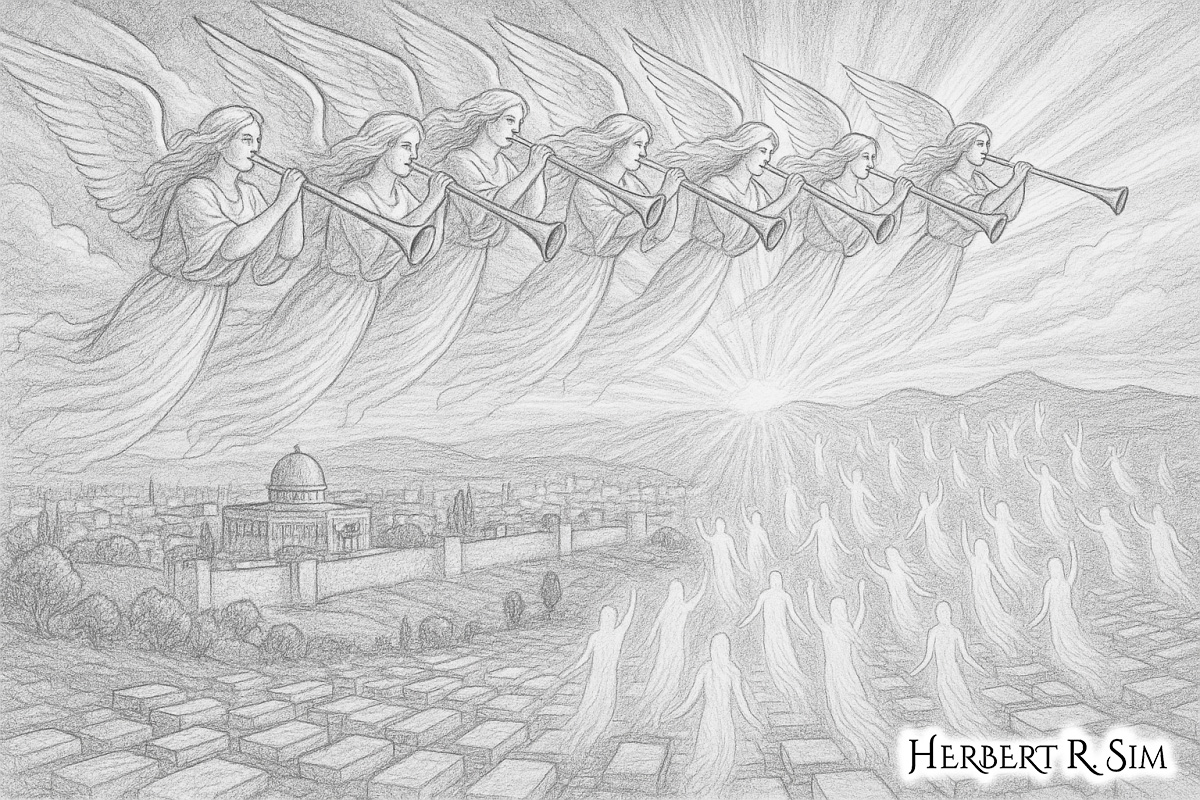
In my illustration above, I feature seven angels blowing on long silver trumpets above the skyline of Jerusalem (with the temple mount), the graves below shimmer as souls rise upward in light.
On this day, the 14th of September, the Catholic church celebrates the Feast of the Exaltation of the Holy Cross — a solemn commemoration of Jesus Christ’s victory over sin and death by His sacrifice on the Cross. In the light of recent prophetic stirring surrounding the possibility of the Rapture occurring on the Feast of Trumpets (Rosh Hashanah), there is fitting urgency to reflect on how the Cross and the coming glory intertwine.
For those who hold to the conviction of Joshua Mhlakela’s prophecy (as shared in his viral YouTube video) that the Lord might return on September 23–24, 2025 — precisely on the Feast of Trumpets — today is a moment to test our hearts, anchor in the Cross, and watch with expectancy.
1. The Prophetic Claim & Its Resonance
In his interview on CentTwinzTV, Pastor Joshua Mhlakela says he received a vision in which Jesus announced that He would return on September 23–24, 2025, which coincides with Rosh Hashanah / Feast of Trumpets. The New York Post picked up the story, giving it wider public attention. This prediction has stirred many believers to ask afresh: is the Rapture imminent, tied to God’s appointed feast days?
Those who accept Joshua’s claim point to a theological pattern: Jesus fulfilled the first four of Israel’s feasts (Passover, Unleavened Bread, Firstfruits, Pentecost) on the exact days appointed. The fifth feast — the Feast of Trumpets — remains as a prophetic shadow for His return to gather His Church. Proponents argue that the Lord would not leave the Feast of Trumpets unfulfilled, and that sounding of trumpets symbolically aligns with 1 Thessalonians 4:16 (“the trumpet of God”) when Christ descends for His own.
The pattern is compelling for many: Israel’s divine calendar, Christ’s perfect timing, and the anxiety of the world all seeming to converge toward that “appointed time.” In other words, Joshua’s prophecy resonates because it fits into a scriptural and symbolic logic that cries out, “Could this be the moment?”
2. Why This Feast Matters
The Feast of Trumpets is unique among the Jewish feasts because it carries a sense of watchfulness and mystery. Its beginning is determined by the sighting of the new moon, and it may begin “in the evening, at midnight, or at dawn” — a variable time beyond human precision.
This ambiguity mirrors Christ’s words in Mark 13:35–36, “Watch therefore — for you do not know when the master of the house will come … lest he come suddenly and find you sleeping.”
Thus, for many believers, the Feast of Trumpets is the most fitting backdrop for the Rapture of Christians: a day of trumpets, of gathering, of mystery, and of suddenness. If Christ is to come “in the silence of the night” or “when least expected,” then He would do well to come on a feast that embraces that very ambiguity.
Moreover, the typology of harvest is also invoked: between Pentecost and Trumpets there lies the “harvest season” in Israel — a period when crops mature and are gathered in. In prophetic typology, this becomes the period when souls are gathered into Christ’s kingdom, culminating in the trumpet-call of the Rapture when the harvest must end. Thus those who see the Rapture on Trumpets see in that the climax of God’s redemptive timetable.
3. The Cross, the Rapture, and Our Watchfulness
But how do we link this speculation with today’s feast — the Exaltation of the Holy Cross — and with what the Church must hold firm?
First, the Cross is the foundation. Jesus had to die before He could rise, ascend, and return. The Cross is the guarantee of His victory. Without the Cross, there is no hope of resurrection, no promise of being caught up with Him. So, if one is to believe in the Rapture, one must first believe in Calvary — that Jesus Christ bore our sins, was raised, and now reigns. The Cross is the anchor under all our hope.
Second, the Cross humbles us. Even if a prophecy is proclaimed, we must not leap into presumption. Jesus warned repeatedly that no one knows the day or the hour (Matthew 24:36). The Church is to watch, not speculate irreverently. Yet watching does not mean fear — it means readiness in faith. Whether Joshua’s prophecy is fulfilled exactly or not, it awakens the Church to sobriety, to repentance, to evangelistic zeal.
Third, the Cross demands transformation. We do not simply await departure; we live cruciform lives here — bearing our crosses, denying ourselves, cleaving to Christ. The Rapture is not an escape from sacrifice, but the consummation of a life surrendered to the Cross. As we stand on Holy Cross Day, we are reminded that even as we long for our resurrection with Christ, we are first called to die with Him daily.

In the sketch, as you can see it differs from the art in full color, as I decide to have the angels spread out on both sides instead.
The concept of seven Archangels comes from various works of early Jewish literature and is found in some Christian traditions. These are often listed as: Michael, Gabriel, Raphael, Uriel, Selaphiel, Jegudiel, and Barachiel. But the Bible only mentions three Archangels by name — Michael, Gabriel, and Raphael; thus I separated on two sides, 3 angels on one side, and 4 angels on the other side.
4. A Word of Encouragement (and Caution)
If the Rapture does indeed occur on the Feast of Trumpets, then God’s sovereign timing is vindicated, and Joshua’s prophecy is confirmed.
If you research deep enough, over the past thousands of years, the calendar have been changed many times, in different countries, different cultures too (e.g. India – Hindu Calendar; China – Chinese Calendar, etc.).
But specifically pertaining to the Jews, are we looking at the Gregorian calendar or the Julian calendar during Jesus’ time, or the Enoch calendar described in the Book of Enoch?
But even if October or some other date is chosen, the underlying spiritual readiness is unaffected. Jesus Himself says: “Keep watch, for you do not know the day or the hour.”
Beloved, let this season awaken us — to prayer, holiness, love, witness. Let our lamps be trimmed, hearts knit to Christ, and lives transparent before God. Let the Cross remain central: we glory not in prophecy but in the One who died and rose. Let prophetic stirring not distract us from holiness. Let vision lead to vigilance.
In conclusion: as we celebrate today the triumph of the Cross, we also watch, with expectation, for the Lord’s coming. Whether the Rapture occurs on September 23–24 or later, today is not wasted. Today we reaffirm: Christ died, Christ rose, Christ reigns — and Christ will come again. May we be found in Him, ready, faithful, unashamed.
